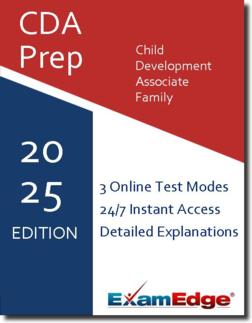Child Development Associate - Family (CDA) Practice Tests & Test Prep by Exam Edge - Blogs
Based on 34 Reviews
- Real Exam Simulation: Timed questions and matching content build comfort for your Child Development Associate Family test day.
- Instant, 24/7 Access: Web-based Child Development Associate Family practice exams with no software needed.
- Clear Explanations: Step-by-step answers and explanations for your CDA exam to strengthen understanding.
- Boosted Confidence: Reduces anxiety and improves test-taking skills to ace your Child Development Associate Family (CDA).



